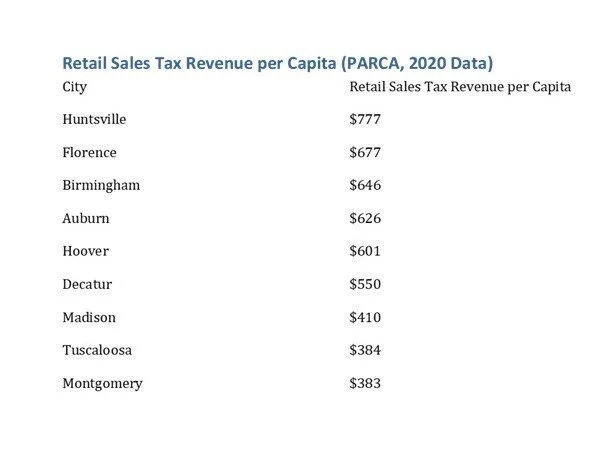Madison behind Huntsville in Retail Sales Tax Collected Per Person
In 2024, the City of Madison generated $24.7 million in retail sales tax revenue—approximately $412 per resident. Just down the road, Huntsville collected a staggering $186.9 million, or about $776 per resident. That’s an 88% higher per capita return in retail sales tax for Huntsville compared to Madison.
This isn’t just a 2024 issue. According to the Public Affairs Research Council of Alabama (PARCA), Madison has historically trailed comparable cities in retail sales tax revenue per person.
Retail Sales Tax Revenue per Capita (PARCA, 2020 Data)
PARCA How Alabama Cities Compare Figure 4
Source: PARCA, “How Alabama Cities Compare” (2022)
Why the Gap?
As Madison’s population has surged there has been a corresponding increase in our Sales and Use Tax Revenue, however on a per capita basis there has been a decrease in the amount of Sales and Use Tax collected. This decrease is a combination of online shopping and shopping outside of Madison, especially for big-ticket items.
This pattern results in retail leakage, where spending flows out of the city and into nearby municipalities like Huntsville, which continue to invest in destination retail, mixed-use developments, and commercial corridors. While Huntsville has outpaced Madison in retail development and recruitment Madison does have one major advantage that we can continue to leverage.
One Major Advantage: The Trash Pandas
Madison is home to one of the most popular and recognizable brands in Minor League Baseball: the Rocket City Trash Pandas. With national visibility, strong attendance, and regular regional draw, Toyota Field is a magnet for out-of-town visitors—and their spending power.
By strategically linking the stadium to nearby restaurants, shops, and entertainment options, Madison can better capture sales tax revenue from visitors, not just residents. But we also have underutilized areas.
Reimagining Underutilized Land: Madison Boulevard & Downtown
Two areas with untapped potential are:
Madison Boulevard: Once a retail artery, it now includes long stretches of underdeveloped commercial and industrial land. With smart rezoning and public-private partnerships, it could become a revitalized hub for restaurants, services, and destination retail.
Downtown Madison: With historic charm, walkability, and city investment already underway, downtown is the ideal place for targeted, area appropriate business development that invites residents and tourists to spend time and money locally.
Innovative Ideas Worth Exploring
To close the retail sales gap and support local entrepreneurship, Madison can consider:
A Downtown Community Theater: A venue for live performances would bring families and arts patrons downtown, especially on nights and weekends.
A Food Truck Park: Designating a permanent or rotating location for food trucks would activate unused land and support small businesses.
A Business Incubator: A small business incubator could help launch and scale local ventures—keeping innovation and jobs rooted in Madison.
Don’t Forget Online Sales Tax
In recent years, online sales tax collection has become a significant revenue stream for Alabama cities, including Madison, through the state’s Simplified Sellers Use Tax (SSUT) program. While these funds help stabilize city budgets, they also underscore a challenge:
Online sales don’t generate foot traffic, local jobs, or broader economic impact the way in-person retail does.
That’s why local retail must remain a priority because it does more than generate revenue. It supports entrepreneurship, creates public gathering places, and defines the character of a community.
What Madison Can Do Next
Here are five strategies Madison can implement to retain more sales tax revenue and support long-term economic growth:
1. Encourage Local Spending: Launch a “Buy Madison” campaign.
2. Zone for Commercial Density: Focus on strategic corridors and reduce permitting hurdles.
3. Attract Big-Ticket Retail: Offer incentives to major retailers.
4. Leverage Events: Expand sports tourism.
5. Promote Transparency & Data: by making data easily accessible retailers can make better decisions about opening businesses in Madison.
The Bottom Line
More people means more opportunity but only if we create the places and policies that support local spending.
Madison has the potential to close the retail tax gap and fund the public services we need roads, parks, public safety, and more but we need to grow smarter, not just bigger. That means bold ideas, strategic investments, and a commitment to making Madison a place where people want to live, work, shop, and stay.
With thoughtful leadership and community collaboration, we can write the next chapter of Madison’s growth story together.

